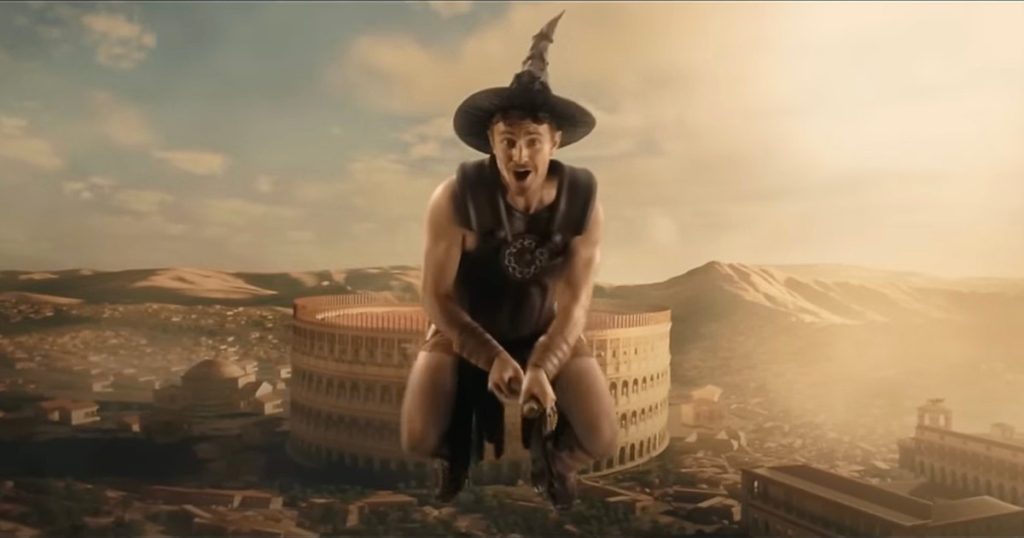Paul Mescal’s debut on Saturday Night Live (SNL) was nothing short of memorable, transforming the anticipated sequel Gladiator II into a hilarious musical parody. The sketch, presented as a fake trailer, poked fun at the current Hollywood trend of turning successful films into musicals, referencing the box office hits Moana 2 and Wicked. The premise was simple: after witnessing the monumental success of these musicals, the producers of Gladiator II decided to add 50 minutes of musical numbers to their violent historical epic through "rushed reshoots." This set the stage for Mescal and the SNL cast to showcase their comedic and musical talents in a series of absurd yet entertaining musical sequences.
The musical numbers within the Gladiator II parody encompassed a variety of styles, from traditional Broadway-esque ensemble pieces to solo ballads and even a rap battle. The opening number, featuring Kenan Thompson, established the setting of ancient Rome with lyrics highlighting its iconic elements: “Swords and sandals / Whores and scandals / And empires stretching from East to West.” Mescal, reprising his role from the fictional Gladiator II, joined in with an enthusiastic "Yeah, I think I’m gonna like it here," immediately setting the comedic tone. The musical journey continued with Mescal’s powerful solo, a reflective ballad where his gladiator character grappled with his identity, yearning for recognition beyond his violent reputation. He sang of being seen as a "killing machine" while harboring deeper desires, hoping that "someday they’ll know my name." This introspective moment provided a stark contrast to the surrounding comedic chaos.
The musical parody didn’t shy away from incorporating contemporary elements and paying homage to other popular musicals. A "song for the women," performed by Jane Wickline, impersonated the yearning wives of Roman soldiers, injecting a touch of melodrama. A Hamilton-inspired rap battle ensued between Mescal and Mikey Day, playing a fictional emperor, culminating in a "floss" dance-off, a humorous nod to modern pop culture. The sketch even referenced Wicked, with Mescal donning a witch’s hat and riding a broomstick, culminating in a powerful rendition of "Defying Gravity’s" iconic high note, replacing the original lyrics with a resounding "No place like Rome." This eclectic mix of musical styles and pop culture references created a layered and highly entertaining parody.
Beyond the Gladiator II musical sketch, the SNL episode was filled with other noteworthy moments, showcasing Mescal’s versatility as a performer. His opening monologue delved into his acting career, referencing his frequent nude scenes and dramatic roles with self-deprecating humor. Another sketch saw Mescal and the SNL male cast members portraying pirate-themed entertainers at a bachelorette party, where Mescal’s playful energy and willingness to engage in physical comedy shone through, even including a brief shirt-ripping moment at the end.
The episode also featured musical performances by Shaboozey, a 2025 Grammy nominee, providing a platform for emerging musical talent. A surprise cameo by social media personality Trisha Paytas, playing herself in a sketch about the 2024 Spotify Wrapped list, added another layer of contemporary relevance and unexpected humor to the show. Paytas’s inclusion reflected the increasing intersection of internet culture and mainstream entertainment.
Mescal’s SNL debut demonstrated his ability to embrace the show’s comedic style, seamlessly transitioning between musical performances, character acting, and physical comedy. The Gladiator II musical parody served as the centerpiece of the episode, displaying Mescal’s willingness to poke fun at himself and engage in the show’s signature absurd humor. His performance, along with the contributions of the SNL cast and musical guests, resulted in a memorable episode filled with laughter and entertainment, further solidifying SNL’s status as a platform for both established stars and rising talent. The episode effectively blended musical parody, contemporary pop culture references, and character-driven sketches, confirming its continued relevance in the modern comedic landscape.

